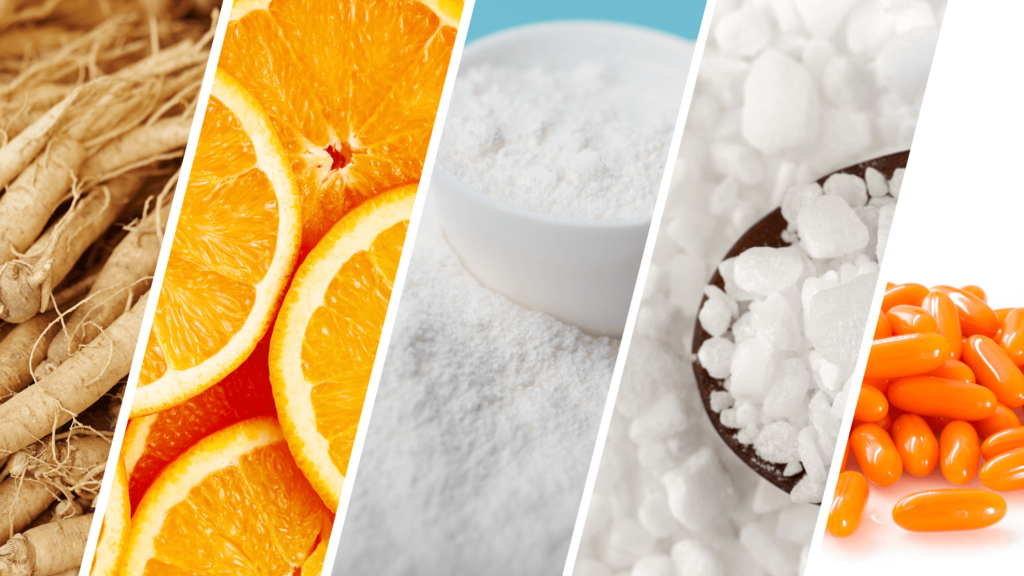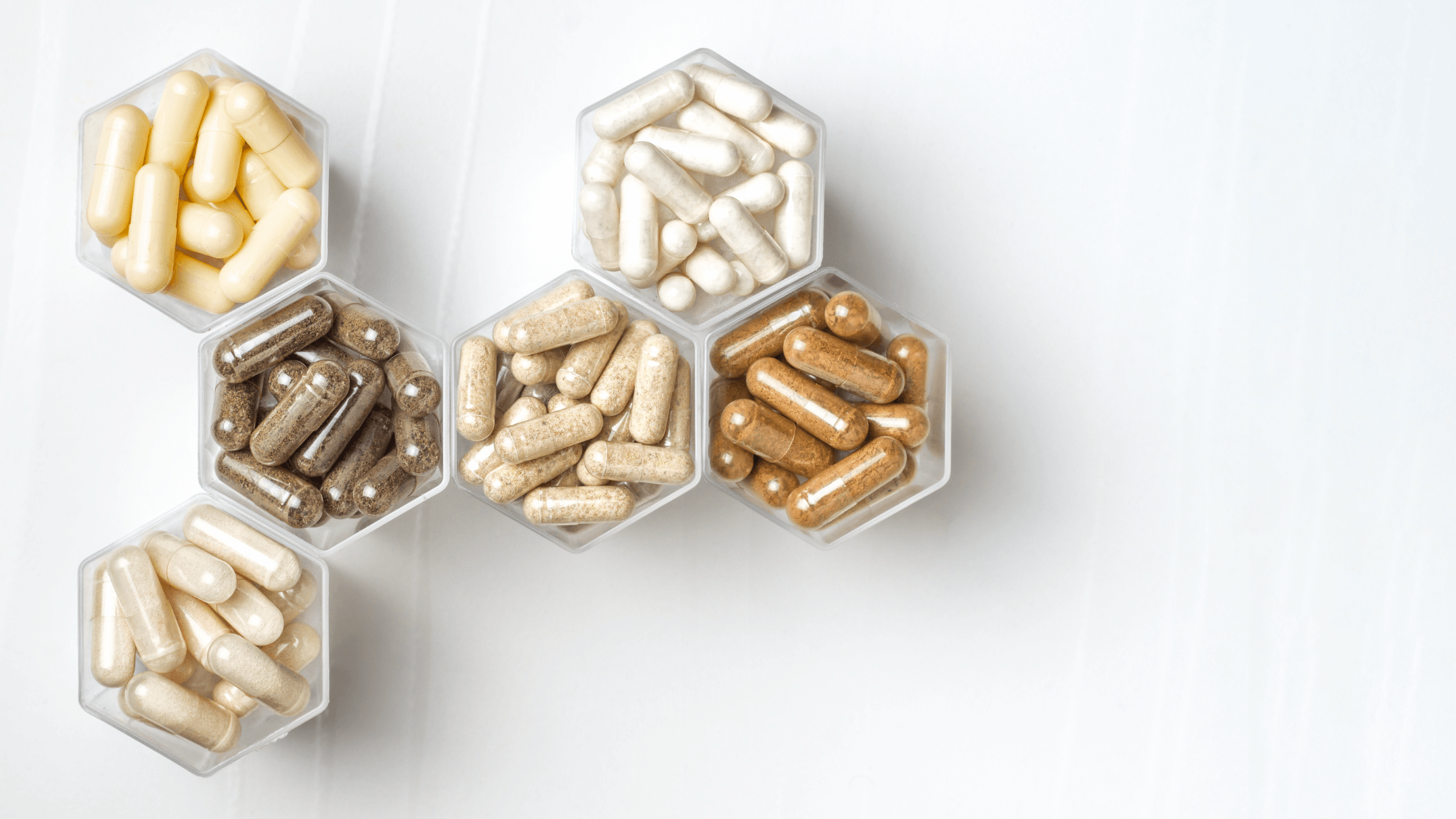Adequate sleep, a healthy diet, and proper hydration provide our bodies with fuel to function at the primary level, but optimizing energy levels beyond the basics is critical to maximizing your performance on and off the job. Supplements like creatine, vitamin B12, iron, ginseng, and magnesium can help target the root causes of fatigue and increase energy levels to enhance your productivity.
The heaviest hitters for energy
Energy levels aren’t as simple as taking this and feeling better—endogenous energy production directly reflects how well your body utilizes nutrients. Still, external factors can also be significant contributors to low energy:
- Poor sleep: Poor sleep causes fatigue and excessive sleepiness throughout the day, preventing the ability to focus and complete tasks.
- Stress: Stress causes your adrenal glands to work overtime, increasing cortisol output. Chronic overproduction of cortisol can increase feelings of fatigue and lead to the dreaded ‘adrenal fatigue.’
- Poor diet or nutritional deficiencies: A high-fat and low-fiber diet affects digestion, and slow digestion zaps energy. Too much or little of certain foods or micronutrients can also impact metabolism and energy balance.
- Alcohol: Alcohol can affect your energy by interfering with efficient sleep cycles, making you feel drowsy the next day.
10 supplements to boost energy levels

1. Ashwagandha
Best for: Stress and anxiety relief
Ashwagandha is an evergreen shrub native to India, Africa, and the Middle East. It is part of the nightshade family of herbs and is best known for having beneficial effects on anxiety, stress, and fatigue. Ashwagandha is classified as an adaptogen, a supplement that helps the body cope with stress.
Adaptogens increase the state of non-specific resistance to stress while lowering the sensitivity to stressors. Simply put, supplementing with adaptogens like ashwagandha can enhance your body’s ability to protect itself in the face of stressors, leading to a higher level of equilibrium (balance) than exhaustion.
This herb also helps to improve blood sugar levels, support heart health, and improve cognition by supporting focus, memory, and some mental health conditions like OCD and depression.
2. B vitamins
Best for: Boosting metabolism and brain function
The B vitamins are a group of eight essential vitamins—thiamin, riboflavin, niacin, pantothenic acid, pyridoxine, biotin, folate, and cobalamin—necessary for energy metabolism. Optimal metabolic processes and energy metabolism ensure your body can adequately convert food into nutrients for energy production. These nutrients can be taken alone or as part of a B complex.
Research shows that B vitamins support brain function and cell metabolism by supporting cellular energetic processes, exhibiting neuroprotective and antioxidative effects, and supporting neurotransmitter synthesis in the central nervous and peripheral nervous systems. They also help prevent infections and improve bodily functions like eyesight, appetite, nerve function, cardiovascular health, hormone production, and good cholesterol production.
3. Ginseng
Best for: Lowering oxidative stress
Ginseng is a powerful herb found in the roots of plants within the genus Panax and is commonly referred to as American ginseng, South China ginseng, and Korean ginseng. It has been shown to help naturally ease fatigue and increase energy levels.
Some of ginseng’s benefits have been linked to its presence of polysaccharides and oligopeptides. These are said to lower stress and increase energy production by boosting antioxidant enzyme activity, supporting mitochondrial function, and reducing inflammation.
4. Iron
Best for: Maintaining energy production and promoting muscle function
Hemoglobin, an iron-rich protein found in red blood cells, transports oxygen throughout the body. Increasing your iron intake directly promotes the production of hemoglobin, which is essential for proper energy production. When iron levels are low, the body cannot efficiently carry oxygen to cells, leading to fatigue and reduced energy levels.
Proper blood flow promotes oxygenation of the muscles, allowing them to function correctly, especially during periods of increased physical activity. Adequate iron levels also ensure the brain gets the oxygen it needs to function. Iron deficiency anemia can develop without sufficient iron levels, leading to fatigue and shortness of breath.
5. Vitamin C
Best for: Immune system support
Vitamin C is a powerful antioxidant that can boost energy levels by decreasing inflammation and alleviating fatigue. It contains compounds that scavenge and neutralize harmful substances in your body, helping to prevent diseases associated with inflammation and oxidative damage. Villain C is also known to bolster energy levels, enhancing the absorption of non-heme iron from plant sources.
6. Selenium
Best for: Maintaining energy via thyroid health
The body’s energy production relies on sufficient amounts of thyroid hormones. An improperly functioning thyroid—hypo- or hyperthyroidism—can lead to changes in energy levels. More specifically, hypothyroidism (an under-functioning thyroid) can leave people feeling tired, sluggish, and depressed. Selenium is one of a few minerals that play a big role in thyroid health by supporting the synthesis of thyroid hormones, protecting thyroid tissue, and maintaining the thyroid’s integrity.
A steady production of your thyroid hormones is crucial for overall health. This will allow your metabolism to function optimally and stabilize your natural energy levels.
7. Creatine
Best for: Energy recovery during and after physical activity
Creatine is one of the best supplements for “quick bursts” of energy. While you may not need maximum energy or power on-site during your day job, it can be a handy supplement for recovery if you plan to hit the gym after work. Creatine works by increasing your body’s phosphocreatine (PCr) stores, allowing for heightened production of adenosine triphosphate (ATP), the body’s primary energy source. Because your muscles require a large amount of ATP to fuel high-intensity exercise, boosting PCr stores directly boosts your body’s ability to produce energy.
8. Vitamin B12
Best for: Improving mental stamina, muscle function, and metabolism
Vitamin B12 is another essential nutrient required for metabolism. Sufficient levels of vitamin B12 help the body metabolize carbohydrates, proteins, and fats, which are then converted into energy. Vitamin B12 is also involved in the production of red blood cells. When your body is B12 deficient, a condition known as pernicious anemia develops, meaning your organs and tissues aren’t getting an adequate supply of oxygen. Your energy levels can tank, leaving you feeling tired and weak.
9. Magnesium
Best for: Increasing overall energy levels
One of magnesium’s primary functions is to convert carbohydrates, proteins, and fats into usable fuel for the body—i.e., it’s essential for nutrient metabolism. As a cofactor in more than 300 enzymatic reactions, magnesium is also required for nerve and muscle function, blood pressure, and blood sugar levels and supports the production of DNA. People who are magnesium deficient often notice symptoms of fatigue.
Additionally, magnesium’s role in muscle and nerve function can support sleep, essential for energy levels and productivity.
10. CoQ10
Best for: ATP production
CoQ10 is a fat-soluble antioxidant that is essential for energy production. It’s a component of the electron transport chain (ETC) that produces adenosine triphosphate (ATP), the primary energy source for cells. As an antioxidant, CoQ10 also protects cells against oxidative damage and lipid peroxidation by reducing pro-oxidative compounds.
Our body’s CoQ10 levels naturally decline with age, making supplementation (or consuming organ meats) vital to maintaining energy levels and overall health, especially in physically demanding industries like construction.
How to choose the right supplement

1. Consider your needs
Before shopping around for supplements, it’s important to consider what you need in terms of supplement outcome and your current health status. Here are a few things to think about before shopping:
- Do I have any allergies or intolerances to be mindful of?
- Do I have specific dietary restrictions that could restrict my supplement intake?
- Are there any known illnesses I have that supplements could impact?
- What, if anything, am I susceptible to which could create risks or side effects if I take supplements?
2. Look at your dietary intake
Your diet should offer the bulk of nutrients to support energy production, but in cases where more is needed, supplements can fill in the gaps. Take a week to track your diet and identify areas where you may be missing certain nutrients—don’t just go willy-nilly buying everything on this list.
3. Choose quality
Quality is everything when it comes time to shop—especially considering nutritional supplements are loosely regulated. Look for supplements from reputable brands that contain high-quality ingredients in their most bioavailable form. Also, consider supplements with recognized certifications:
- Certified gluten-free
- NSF
- GMP
- USP
- USDA organic
- Non-GMO Project Verified
- Certified vegan
Check for certifications on the bottle, research the ingredient list, and dig into the reviews. If you’re unsure what to look for, speak to a nutritionist or healthcare professional.
4. Choose the correct form
Supplements don’t only come via pill—there are several ways to reach your ideal intake levels. Common supplement intake forms include:
- Pills
- Softgels
- Capsules
- Powders
- Tablets
- Pre-mixed beverages
- Gummies
- Tinctures
5. Consult with your healthcare professional
A health professional who can access your medical history will be able to help with these questions and any additional background information you need before you begin with supplements.
If you have any preexisting conditions or illnesses, a healthcare professional can advise on what supplements to take, in what form, and even which brand might be best for you. After you begin with supplements, monitor the effects and how you feel. From there, consult your doctor if you feel unwell in any regard.
Other hacks to support energy levels
1. Get a good night’s sleep
A good night’s sleep is the foundation for a productive and energetic day. Here are some tips to optimize sleep:
- Maintain a cool temperature in your bedroom—between 60 to 67°F (15 to 19°C)
- Reduce screentime 2-3 hours before bed
- Invest in blackout curtains/shades or a sleep mask for complete darkness
- Avoid alcohol and caffeine 6-8 hours before bed
- Be consistent with your bedtime schedule, even on weekends
2. Reduce stress levels
Stress significantly contributes to energy levels and can interfere with sleep and productivity. You can maintain consistent energy by actively practicing activities that reduce stress. Here are some simple things you could engage in:
- Try meditation or other mindfulness activities to calm the nervous system
- Test out aromatherapy as a form of stress reduction
- Build a habit of journaling to relieve mental stress
- Invest in natural sleep supplements
3. Get outside in nature
Another way to promote healthy energy and reduce stress is to spend quality time outside. Fresh air promotes good sleep hygiene, and exercising regularly by moving your body outside is a great way to restore energy.
Forest bathing is another excellent option. It is a hybrid of meditation and nature walking with therapeutic benefits for alertness and energy.
Bottom line
Finding ways to gain energy doesn’t have to be complicated. By speaking with a healthcare professional, considering your needs, and identifying which lifestyle choices may affect your energy levels, you can choose a supplement to help you get on track.
B vitamins, selenium, CoQ10, and ashwagandha are all great options for tackling fatigue, increasing focus, and boosting productivity on and off the job site. But before delving into a whack of supplements for energy, research, choose a reputable brand, and pick the proper intake form.
To learn more about nutrition and wellness for construction professionals, follow us on social media and subscribe to our weekly newsletter.



1 comment